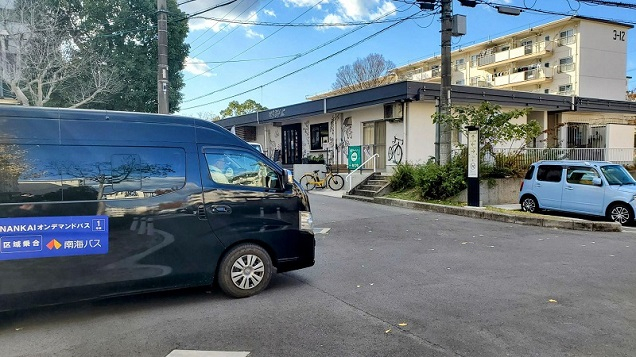Research News
Feb 26, 2025
- Human Life and Ecology
At your service: How older adults embrace demand-responsive transportation
Unveiling the acceptance of new public mobility services for older adults
Demand Responsive Transportation in Senboku New Town, Osaka
Closing the mobility gap for the elderly
Credit: Haruka Kato, Osaka Metropolitan University

In residential areas, where a growing number of older people live, the first- and last-mile mobility between their homes and bus stops has become a social problem. Older adults are encouraged to relinquish their licenses and rely on public transportation. Demand-responsive transport (DRT) has the potential to address this social problem. DRT is a mode of transportation that dispatches on demand to pick up and drop off passengers according to their needs. However, older adults’ lesser acceptance of digital solutions poses a challenge to this new system.
Dr. Haruka Kato, a junior associate professor at Osaka Metropolitan University and Osaka University Assistant Professor Dr. Kento Yoh investigated the factors influencing older adults’ acceptance and use of demand-responsive transport (DRT) in Senboku New Town, Osaka. This study applied the unified theory of acceptance and use of technology model, moderating for age differences between older people and adults. Participants were recruited via the Health-Smart-Senboku smartphone application.
The results revealed a significant relationship between social influence and behavioral intention for both older people and adults. In addition, behavioral intention significantly correlated with performance expectancy for older people and with trust and safety for adults.
“The project operator, Nankai Electric Railway, and the Sakai City government held 47 meetings during the project period to inform the local communities about how to use the smartphone application for DRT. In addition, significantly older people acquired information through face-to-face consultations about DRT usage and referrals from family and friends,” said Dr. Kato. “Our findings informed policymakers of the importance of emphasizing social influence to promote DRT use among older adults.”
The findings were published in Transportation Research Interdisciplinary Perspectives.
Funding
Haruka Kato received funding from the Japan Society for the Promotion of Science (24K17421). Kento Yoh and Haruka Kato received funding from the JST COI-Next (Grant JPMJPF2115).
Paper information
Journal: Transportation Research Interdisciplinary Perspectives
Title: Acceptance and use of demand-responsive transport by older people in old New Town: Evidence from Senboku New Town
DOI: 10.1016/j.trip.2024.101295
Authors: Haruka Kato, Kento Yoh
Published: 14 December 2024
URL: https://doi.org/10.1016/j.trip.2024.101295
Contact
Haruka Kato
Graduate School of Human Life and Ecology
E-mail: haruka-kato[at]omu.ac.jp
*Please change [at] to @.
SDGs

